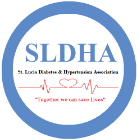.jpg) High blood pressure itself is usually asymptomatic, meaning that patients do not experience any direct symptoms of the condition. This is why hypertension is often referred to as "the silent killer," as it can quietly causes damage to the cardiovascular system.
High blood pressure itself is usually asymptomatic, meaning that patients do not experience any direct symptoms of the condition. This is why hypertension is often referred to as "the silent killer," as it can quietly causes damage to the cardiovascular system.
Hypertension can also lead to problems in the organs affected by high blood pressure. Long-term hypertension can cause complications through arteriosclerosis, where the formation of plaques results in narrowing of blood vessels.
The complications associated with hypertension-related arteriosclerosis can include:
- An enlarged or weakened heart, to a point where it may fail to pump enough blood (heart failure)
- Aneurysm- an abnormal bulge in the wall of an artery (which can burst, causing severe bleeding and, in some cases, death)
- Blood vessel narrowing - in the kidneys this can lead to possible kidney failure; in the heart, brain and legs, this can lead to heart attack, stroke or the need for amputation, respectively.
- Blood vessels in the eyes my rupture or bleed, leading to vision problems or blindness (hypertensive retinopathies - classified by worsening grades one through four).
Diagnosis and tests for hypertension
 Diagnosis of hypertension is made by measuring blood pressure over a number of clinic visits, using a sphygmomamometer - the familiar upper-arm cuff device. An isolated high reading is not taken as proof of hypertension. Rather, diagnosis can be made after elevated readings are taken on at least three separate days.
Diagnosis of hypertension is made by measuring blood pressure over a number of clinic visits, using a sphygmomamometer - the familiar upper-arm cuff device. An isolated high reading is not taken as proof of hypertension. Rather, diagnosis can be made after elevated readings are taken on at least three separate days.
Measurements may be taken at the doctor's office while a patient is seated and after standing; this helps the doctor to look for orthostatic or postural hypotension.
The reliability of blood pressure readings may be improved by having a patient or someone else take a series of measurements outside the doctor's office using standardized devices.
We have more detailed information about measuring blood pressure.
In addition to measuring blood pressure using sphygmomanometry, a doctor will take a history (ask questions, such as about cardiovascular problems) and do a physical examination before diagnosing hypertension.
These questions and additional tests can help to identify the cause of high blood pressure and determine whether there have been any complications. Such tests may include urine tests, kidney ultrasound imaging, blood tests, an electrocardiogram (ECG) and/or an echocardiograph.




